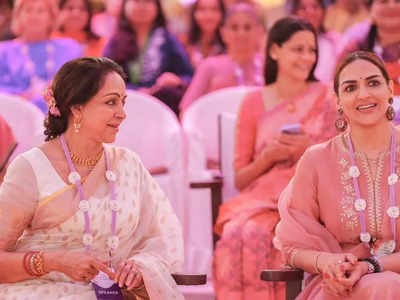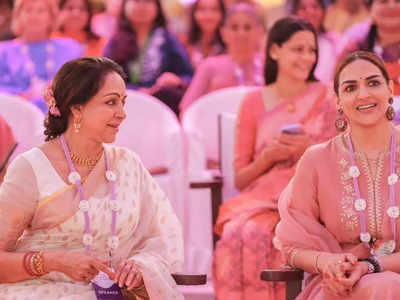BOMBAY TIMES (February 20, 2025)
Two generations of women, actor, dancer and politician Hema Malini and her daughter, actor Esha Deol, at the 10th International Women’s Conference, held over three days in Bengaluru, at a session namely ‘Circle of Wisdom’, shared their insights on the evolving roles of women, motherhood, and adapting to changing times. Key takeaways from the interaction
‘I was five-six months pregnant while shooting for Razia Sultan’: Hema
It was my dream to have a child. I was so excited when Esha was born, yet I continued my career as a dancer and actress. An actress’s career has limitations, but a dancer’s doesn’t. I remember shooting even while pregnant with her. I was working on Razia Sultan — I think I was five or six months pregnant. If you’re strong and determined, you can achieve anything. This was, of course, thanks to my family’s support, my mother, my aunt, everyone. They took care of the children, allowing me to continue my dance and film careers. I was very particular, though. To avoid them missing school, I’d take them and drop them off myself. Then I’d go to shoots and come back early. I told producers I wouldn’t do late shoots; they had to finish my work by 6 pm. I planned my life carefully to manage everything. Today, I see the same thing happening with my daughters and their children.
‘I didn’t insist that my daughters learn and do what I had’: Hema
I was born into a very traditional Hyderabad family. My mother was a strong personality. She decided I would learn Bharatanatyam. My transition as a dancer was beautiful, though strict. I faced hardship; I wasn’t allowed to play like other girls. But because of my own experience with my mother, I didn’t want to impose the same on my girls. For a long time, I didn’t insist they learn what I had. They happily went to school, jumped around, and played with friends. Eventually, I suggested Esha learn to dance. At first, she refused. Then I put her in Bharatanatyam. She found it difficult, but she was eager to learn. That’s how she came into films. I was scared she wouldn’t act properly. But she did.
‘Today I learn a lot from my daughters’: Hema
I’m a grandmother, but I learn much from my daughters. They have so much experience. My other daughter, Ahana is also a beautiful dancer. Today, she’s a mother of three, including twins. I can’t believe how she takes care of them. She never wanting to be influenced. Both are wonderful; I’m blessed.
‘I thank each one of the women who made me what I am today’: Esha
Growing up, I realized I was the daughter of the ‘dream girl,’ of Sita, Urbita, and so many other film characters. I grew up in a South Indian, almost all-women household — my grandmom, granddads, cousins — most of us were women, but strong-headed, strong personalities. I saw so many variations of what women could be within one household.
‘Every day, I saw (my mother) getting ready, looking all pretty, and going to work. It fascinated me’: Esha
Being a millennial, our generation witnessed maximum transition. Technically and emotionally, our generation went through much. We had freedom growing up. We strayed, but a strong foundation brought us back. Dance and films were inescapable. My mother’s makeup room was right in front of my bedroom. Every day, I saw her getting ready, looking all pretty, and going to work. It fascinated me. Dance ballets were choreographed in our house; we had a dance hall, and Gurus came. There was no escaping dance and culture. I see the same with my daughters, Radhya and Viraya. Dance has passed down through generations.
‘After my first film, I was called chubby, compared to mom’: Esha
At 18, I got into films. Like my mom said, I was very bindaas, carefree; I played football. When my first film released, I was a teen and had baby fat. After the movie’s release, I read the review. And in that, they wrote, ‘she’s chubby, she has baby fat’. And they started comparing me to my mom, which I was not prepared for. I thought, ‘okay, I’ve started acting, I’ll act’. But it was not easy. And that was where I realized how to be focused on the goal without letting these affect me. I realized that people are going to keep comparing me to my mom, who’s already a legend. So if you’re going to let that affect you, you’re not in the right profession.
‘Back in the day, people liked, admired, or disliked us from a distance’: Esha
My children are still young, and not yet on social media. When they get there, I’ll see how I navigate that. I’m still getting used to it myself — like many from my generation. When we started in the public eye, working and being acknowledged through films or dance, there was no social media. We were used to that authentic, real connection through cinema halls or stage performances. People liked, admired, or disliked us from a distance. Our focus was purely on the performance and coming home. There were no paps, no calling them to the airport. It’s how everyone functions today. I’m not complaining. But we didn’t have that. Now, after my babies, it’s a new space. We need a PR agency, we need to announce our whereabouts (unless it’s work-related), social media, followers, likes, and comments — it’s a lot. Many of my friends are mommy bloggers and social media influencers.
Inputs by Mehwash Hussain


